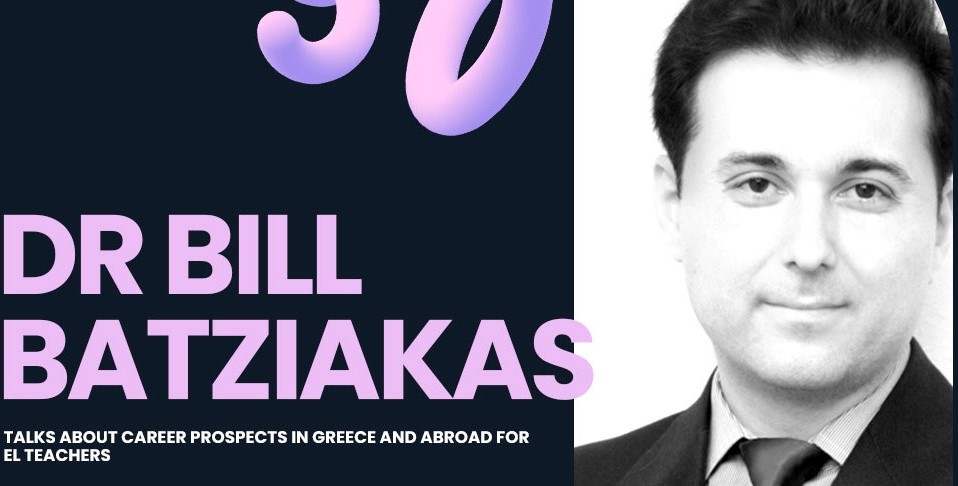Let us start our interview with getting to know your academic background. So, at which universities did you study and which degrees did you obtain?
I first studied at the National and Kapodistrian University of Athens, where I obtained a BA in English Language and Philology (Strand of Language and Linguistics). Then, I moved to London, and I obtained an MA in TESOL (Strand of Language Pedagogy) from the UCL Institute of Education (University of London), as well as a PhD in Language, Discourse, and Communication (Strand of Applied Linguistics and English Language Teaching) from King’s College London (University of London).
Have you worked in Greece or only abroad?
I have worked both in Greece and abroad. Soon after obtaining my BA, I worked for one year at the language centre of Evrognossi Zografou, since back then I was living in Zografou, near the School of Philosophy, where I did my BA. Then, I participated in the last written competition of ASEP, and I did well enough to be offered a permanent position at a high school.
I first accepted my appointment but later resigned because I had already moved to London to do my PhD. While in London, I worked for one year as a Research Assistant on a big funded project led by some of the professors in my department, and then I worked for three years as an Associate Lecturer in the postgraduate program MA in Applied Linguistics for English Language Teaching offered by Queen Mary (University of London).
After London, I moved to China, where I worked for four years, first as a Lecturer of English Studies and Leader of the English for Academic Purposes Committee at Wenzhou-Kean University (a Chinese-American university near Shanghai), and then as a Senior Lecturer and then Assistant Professor of Academic English Studies and Associate Director of the Centre for Academic English Studies at Dongbei University of Finance and Economics (specifically at one of their Chinese-English institutes near Beijing).
After that, I was offered a position as a Lecturer of English and Welcoming Mentor of New Faculty Members at Qatar University, where I have been for two years now.
An integral part of an academic career is giving presentations at conferences and publishing articles and books. Could you tell us a few things about your conference presentations and article and book publications? What can you identify as your motivation behind them? Which do you consider most important?
It is true that “publish or perish” describes the pressure on academics to produce frequent research output. This is considered essential for success in their field, based on metrics used for hiring, tenure, and promotion. In addition, many academics are motivated by a desire to share their findings with colleagues and contribute to the advancement of their field.
With all this in mind, I would say that my research output so far has been motivated by both. To this end, I have given various regular and invited presentations in Athens, London, Rome, Vienna, Helsinki, Istanbul, Hong Kong, Shanghai, Beijing, Dubai, Doha, and elsewhere, mainly at international conferences that focused on a particular theme or paradigm, such as the international conferences on English as a Lingua Franca (ELF), or at international conferences of TESOL Asia and TESOL Arabia. In terms of publications, I would say that my most important ones are two: my first one and my latest one. My first one was a chapter that looked at Greek speakers’ phonological features when they use English within the paradigm of English as a Lingua Franca (ELF), and it appeared in the book ‘Teaching the Pronunciation of English as a Lingua Franca’ (Oxford University Press, 2010). My latest one was ‘Hybrid Learning in ELT: Motivation, Challenges, and Opportunities,’ a volume which I co-edited with two of my current colleagues, with contributions from various academic peers around the world, looking at English language teaching approaches and methods, curriculum and syllabus design, materials development, and testing and assessment (Cambridge Scholars Publishing, 2023).
Let us now turn our attention and look at the numerous ELT professionals of all ages and in all cities of Greece. Which professional positions would you identify as the most rewarding ones for them and why?
First of all, let me say that I understand that most of the professional positions in the ELT field in Greece are deemed rewarding based on the benefits and perks they offer, such as salary, bonuses, leaves, pension plans, and so on. Although I would say all these are indeed ubiquitous when it comes to job hunting, there are many more things to consider. For instance, language centres constitute a very good option for ELT professionals who would like to get a good understanding of teaching and learning while at the same time not having to leave their city, especially if they have familial or parental obligations.
Then, there are teaching positions in primary schools and high schools, which also offer solid practice in teaching and learning, with the added benefit of job permanency. However, their openings are very few and infrequent, and they may appear far from one’s city. Private primary and secondary schools also exist, but they tend to be in larger cities. One can also go for an MA and a PhD aiming at getting a teaching position at a university, but these openings are even fewer and more infrequent, and again universities are only in larger cities.
In addition to the above, there are also publishing houses and testing organizations, which are usually outside the job-hunting scope of ELT professionals in Greece, but I would say that they may also constitute good professional opportunities. It is also worth mentioning that the private sector can offer professional opportunities to ELT professionals both as employees and as owners of the respective businesses, for instance, both working at a language centre and owning one, and this is something that certainly widens the scope of professional opportunities for them. So, I do not think that there is any one of them that is more rewarding than the others. It all depends on where someone lives, whether they are able and willing to move to another city, and what they like and what priorities they have.
What about working abroad? Is it easy or difficult? Is it the same or different from working in Greece?
Well, there are certainly many similarities regarding the passion you need to have, the professionalism you need to exhibit, and the continuous professional development you need to seek all the time. However, there are also significant differences in terms of the benefits and perks offered, the resources and facilities, and the respect from the students, especially at the local-foreign institutions of the Far East and almost all the institutions of the Middle East. Needless to say, another difference is the ‘trading off’ that you need to be clear about and decide on. Living and working abroad may look exciting, but it comes with leaving behind your city, your country, and your favorite places and people, and this may be a daunting experience.
Any final advice to the ELT professionals in Greece or any other final words?
I would like to close this interview by emphasizing something which I mentioned above: the similarities regarding the passion you need to have, the professionalism you need to exhibit, and the continuous professional development you need to seek all the time. The areas of endeavor may differ, but the principles of personal satisfaction and professional recognition remain the same. All you have to do is identify and follow these principles to the benefit of yourself and your students, no matter whether it is in the private or public sector, and no matter whether it is in Greece or abroad.
Dr. Bill Batziakas has been on the ELT Excellence Awards Judging Committee for four consecutive years. We heartily thank him for devoting time and energy to the evaluation of candidates.




